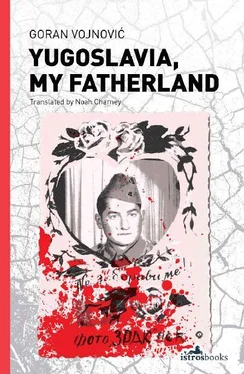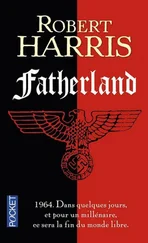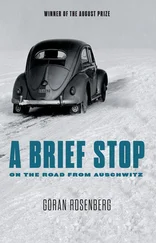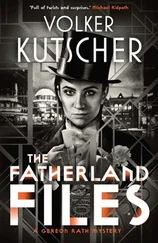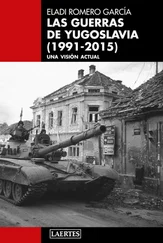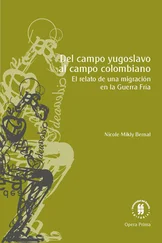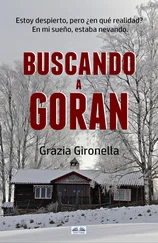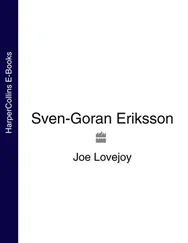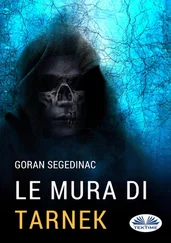So I doubled back and decided to intercept my father in front of the shop. I could tell that he was dragging himself more slowly than usual, so there was no way he would get away from me. His gaze was empty, like a blind man’s, and I stood before the shop and watched as he approached. I felt like he was about to go past me, just as he had passed by the crowd in the dormitory. As my Aunt Enisa would have said, ‘He walked by without so much as a glance.’ But he did stop, eventually he did, and gave me a bear hug that nearly took my breath away, and under his uniform I could feel his abs, which the military had sculpted for him, and which he enjoyed showing off while wading through the shallows on beach holidays. Mother and I liked to tease him about that, and then he would divert us with some story about the difference in water and air temperature, and how it wasn’t healthy to dive into the sea. My father never drank at work, and I heard him say, countless times, that only in Yugoslavia would people drink more while at work than after work, and that this would send the country to an early grave. But that day he held me so powerfully in his muscled arms that I thought, in all seriousness, that he must be drunk.
He finally let go, but only to grab me by the arms a moment later, drawing me close and staring at me with an strange look in his eyes. After what felt like far too long, at the point when I thought he had finally lost it, he asked me if I’d like to go with him to the market and get a He-Man.
Such a suggestion could mean only one thing: something was horribly wrong. Action figures from my favourite cartoon were the best toys ever, but Mother had lain down the law and said that I couldn’t get any more, since I already had three from the series (He-Man, Skeletor and Tilo) and that, she said, was more than enough. She thought these action figures were way too expensive, and that I wouldn’t even play with them, since I was too old for that sort of toy. She also said that I only got them because I was spoiled. When she said this, she’d look at my father in a special way, and he would always pretend that he had no idea what she was talking about.
We walked in silence toward the market. My father didn’t stop every few metres to say hello to someone or go off for one of his ‘quick drinks’ with Vlatko or Mate, resulting in my having to carry the bag of shopping home myself. Such events would inevitably end in him stumbling home in the evening, giving my mother a drunken hug, a sort of dance in which she would scoot away, offended, then he’d hug her again, and promise there would be no more quick drinks next month. But that day, my father was strolling around Pula, his head bent low, hardly even nodding to the people he knew. What surprised me even more was that he didn’t want to stop at Nikola Tesla Park, where there was an old shack smothered in graffiti that read ‘Republic for Kosovo, Continent for Istria,’ and where we would almost ritually show up to count the gaggle of barefooted youths who multiplied every time. Father and I had taken to naming these kids ‘little Gypsies,’ because so many of them went swimming, every day, at the end of a long jetty wearing only T-shirts: just like Jovan’s son, Milan, a skinny teenager who, according to my mother, wore the shirt into the water in order to hide his prominent rib cage from the girls in class.
I never found out what the little Gypsies were hiding under their shirts, and I was never really interested, to be honest. My father, on the other hand, kind of adored the little Gypsies, and loved to say that he was one of them, especially when he was draining a bottle of his beloved Stanzec plum brandy. Then he would explain, in all seriousness, that when he had been no bigger than a bread loaf, his Gypsy parents, who had eighteen more little Gypsies to go along with him, had forgotten to take him with them, when they left the town of Futog, in Vojvodina, with their circus tents. By necessity, he had been adopted by a nice Serbian uncle, and an even nicer Hungarian aunt who, unfortunately, had died too early and wound up leaving him with the Yugoslav People’s Army when he was just a little boy. People used to listen attentively to my happily gregarious father, but never knew whether they should feel sorry for him, or envy him, for his life full of stories.
Regardless of whether or not my father had really been forgotten by Gypsy circus performers, or whether he had invented the story to gloss over a sad orphan childhood, raised by captains and corporals, it was nevertheless an indisputable fact that I was the proud owner of multiple He-Man action figures through the good graces of Maki, the Gypsy who sold them from one of the stalls. Father would haggle with him as long as it took, sometimes taking a good half hour to bring the price down from eight to four dinars. Only then, when Maki had accepted defeat and mumbled that four dinars was outright thievery, stealing from the mouths of the good people who smuggled the toys for him, would my father put ten dinars in Maki’s hand, pat him on the back, and say that he’d never met such an honest Gypsy in his life.
But there was no haggling that day. Father put the money in Maki’s hand without saying a word. Before I’d had a chance to glance over the shelves full of colourful junk, he had already disappeared into the crowd of Pula market. For the first time in my life, I was worried about my own father, and I began to push my way through the shoppers, almost in a panic. I had this idea that my father, lost in thought, would step out into the street without looking both ways, and some crazy Italian tourist, or an old drunk on a Vespa, would run him over. So I was running, action figure in hand, ever more nervous, bumping into ladies in floral dresses as I skittered through the market. My father was nowhere to be seen. It even occurred to me that he had forgotten we’d come together, and had headed home for lunch, when I finally saw him standing in front of the entrance to a department shop, looking confused. I was about to run to him when someone put their hand on my shoulder and rooted me to the spot. I turned around and saw Maki anxiously looking at me with his big black eyes. ‘Your old man is being very weird today. He wasn’t seconded, too, was he?’
I had never heard the word ‘seconded’ before and had no idea what it meant. I was eleven years old, and dreamed only of Mario borrowing his father’s boat and the three of us gliding off to a nearby island.
‘Republic for Kosovo, Continent for Istria’
I hadn’t a clue as to how this long-lost graffiti came to appear in Pula, but sixteen years later it seemed as though the letters beat a rhythm into my racing heart. Images, faces and places I had buried deep beneath the surface of my consciousness flashed before my eyes, like some strobe-lit MTV video. My past life flooded back like an hallucination, and I felt like I was on an uncontrollable merry-go-round which was about to catapult me into a world I’d long been convinced that I could block out. My turbulent, unrestrained subconscious shook itself loose and I surrendered to it, against my will. The bold black letters sprayed against the white walls of Pula flashed brighter and more vividly, as if they might explode with the cubes of stone on which they were painted. REPUBLIC FOR KOSOVO, CONTINENT FOR ISTRIA!
I sat in my twenty-year-old wreck of a car, parked in a garage next to the enormous brightly painted heating-plant in downtown Ljubljana. I should’ve driven straight over to Enes, my nearly legitimate mechanic, so that professional Bosnian clown could massage my car into shape for its first long-distance trip in many moons. But instead I just stared at the garage wall, where my illusions were locked in combat. I tried to put my left leg into the car and press against the soft Japanese clutch, but my leg, as if it belonged to someone else, just lay on the concrete garage floor, disinterested in the rather important detail that Enes’ random working hours were probably winding to a close. For a moment I got worried that I would never be able to tear myself from this petrification of body and brain. I couldn’t recall the last time I thought about Pula, of those white officers’ apartment buildings and my childhood there before that summer of 1991. I’d buried them all in the ground one day, without bothering to mount a tombstone; without coffin, without grave candles, without eulogy or procession. Buried them and walked away, never looking back over my shoulder and convinced that this forgotten world would never burst from its grave and pursue me.
Читать дальше
